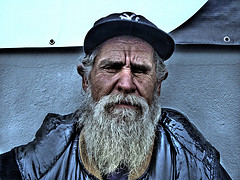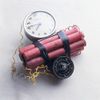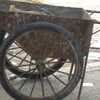Arik Ascherman: Rabbi-activist for the rights of Israelis, Palestinians, and foreign workers in Israel
By Rabbi Arik W. Ascherman on June 4, 2007 - י"ח סיון תשס"ז
"Sometimes, when you have tried everything else, and particularly when you see the values that we are sworn to uphold as rabbis being trampled on, you have no choice but to stand in front of the bulldozers, to exercise that democratic right of civil disobedience to try to have the opportunity in court to show that it's the law, the policy, that's really illegal and immoral."
Arik Ascherman is Executive Director of Rabbis for Human Rights in Israel. His personal journey has evolved from acquiring a Harvard education to standing trial in Israel for blocking home demolitions.
Born in Erie, Pennsylvania, Ascherman graduated from college in 1981. From then until 1983, he worked for Interns for Peace, a community work program in Israel involving Jews and Arabs. For most of this time, Ascherman lived in the Arab village of Tamra.
In 1989, he was ordained as a rabbi in the U.S. at the Hebrew Union College-Jewish Institute of Religion. During his training, he worked with soup kitchens and homeless advocacy in Israel. Following his ordination he worked as a rabbi and with Hillel chapters in the U.S. In Israel, he was director of Congregation Mevakshei Derech and was the part time rabbi of Kibbutz Yahel, a Reform kibbutz near Eilat.
He became a citizen of Israel in 1994, where he lives with his wife, Einat Ramon, the first Israeli-born woman to be ordained as a rabbi, and their two children.
Beginning in 1995, Arik Ascherman became co-director of Rabbis for Human Rights (RHR); becoming executive director in 1998. RHR is the only organization in Israel made up of rabbis and rabbinical students from all denominations of Judaism. It promotes justice and human rights for Israelis, Palestinians, and foreign workers. In May 2006, RHR received the prestigious Niwano Peace Prize.
Over the next few years, his commitment to human rights led him to nonviolent resistance to block bulldozers from destroying Palestinian homes. As a result of his actions, Ascherman was charged with "interfering with police performance of duties on two different occasions in 2003, and the intention to commit acts to prevent police from performing their duties." During his trial Ascherman explained his actions,
"I arrived at the homes for which I am on trial today carrying in my heart all the families in whose name I stand before you - the families that suffered and continue to suffer because of the home demolition policy. I held in my heart the looks of the children in Shufafat who had gone off to school in the morning and returned to discover their home demolished, with a toy or book peaking through the rubble ... I held in my heart the frightened looks of families sitting on packed suitcases waiting for the bulldozers to arrive, the grown men crying and the tens, if not hundreds of families whom I have spent time with before, during and after home demolitions."
In March 2005, a magistrate court found Ascherman guilty but said that he wouldn't have a criminal record. Upon his conviction, Ascherman said that he was disappointed the court did not address the injustice of home demolitions in its verdict.
"For us, this trial really was about the people who have no voice here, the victims of home demolition," Ascherman said. "And that's why we're going immediately from the courthouse...to begin the rebuilding of one of these homes."
Recent protests by Ascherman and Rabbis for Human Rights have focused on the separation wall. In 2006, RHR achieved a major victory when it won a lawsuit to prevent the wall construction from dividing the village Sheikh Sa'ad.
from Profiles of Peace: http://www.afsc.org/israel-palestine/profiles-of-peace/arik-ascherman.htm
Meginflokkur: Stjórnmál og samfélag | Aukaflokkar: Bloggar, Menning og listir, Trúmál og siđferđi | Breytt 25.7.2008 kl. 00:35 | Facebook


 dolli-dropi
dolli-dropi
 malacai
malacai
 bjarnihardar
bjarnihardar
 brandurj
brandurj
 ea
ea
 killjoker
killjoker
 coke
coke
 vglilja
vglilja
 gudrunmagnea
gudrunmagnea
 neytendatalsmadur
neytendatalsmadur
 veravakandi
veravakandi
 hehau
hehau
 gorgeir
gorgeir
 hlynurh
hlynurh
 disdis
disdis
 ingabesta
ingabesta
 jevbmaack
jevbmaack
 palmig
palmig
 joiragnars
joiragnars
 manisvans
manisvans
 stebbifr
stebbifr
 svanurg
svanurg
 vefritid
vefritid
 vestfirdir
vestfirdir
 para
para
 hreinsamviska
hreinsamviska
 kreppukallinn
kreppukallinn
 veffari
veffari
 arnith
arnith
 icekeiko
icekeiko
 andres08
andres08
 skagstrendingur
skagstrendingur
 gattin
gattin
 skulablogg
skulablogg
 haugur
haugur
 heimssyn
heimssyn
 snjolfur
snjolfur
 kreppan
kreppan
 kamasutra
kamasutra
 ksh
ksh
 larahanna
larahanna
 raudurvettvangur
raudurvettvangur
 siggisig
siggisig
 siggith
siggith
 lehamzdr
lehamzdr
 vest1
vest1
 iceberg
iceberg





Bćta viđ athugasemd [Innskráning]
Ekki er lengur hćgt ađ skrifa athugasemdir viđ fćrsluna, ţar sem tímamörk á athugasemdir eru liđin.